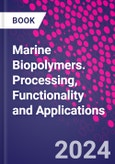Marine Biopolymers: Processing, Functionality and Applications focuses on recent developments in the isolation, characterization, and processability of these materials for biomedical, nutraceutical, cosmetic, and regenerative medicine applications.
The marine environment represents a huge single resource for the development of natural biobased materials with enhanced, well-characterized and multi-functional properties. The isolation, characterization, and processability of these materials are crucial for the development of the marine biotechnological industries. In recent years, novel biobased materials have been extracted from marine habitats that have been proven to have exceptional wound-healing characteristics and anti-cancer therapeutic benefits. Moreover, some components based on marine resources can play a key role in medicinal food applications, in cosmetics as well as in the pharmaceutical sector.
Marine Biopolymers: Processing, Functionality and Applications is a valuable reference resource for scientific and academic researchers, industrial R&D and those working in the marine biotechnology industries that produce microalgae and natural bioproducts. The book will also be relevant for researchers working in aquaculture, biology, bioenergy, and biofuels production, as well as food and nutrition, cosmetics, and the pharmaceutical industry.
Please Note: This is an On Demand product, delivery may take up to 11 working days after payment has been received.
Table of Contents
Part I
Overview, Extraction, Characterization, and Physico-chemical Properties
1. Marine biopolymers: An overview
2. Characterization of marine biopolymers
3. Techniques of extraction of marine biopolymers
4. Advancements in nanofabrication of marine biopolymers
5. Biointeraction of nanomaterials with marine biopolymers
6. Toxicity of nanostructured marine biopolymers
7. Fabrication of micro- and nanodevices for tissue engineering
8. Potential impact and consequences of particle size, shape, and surface area of functional marine biopolymers
9. Nanostructured surfaces in biopolymers- Characterization of nanostructures.
Part II
Biological and Biomedical Applications
10. Therapeutic applications of marine biopolymers
11. Marine biopolymers for antimicrobial therapy
12. Marine based nanoparticles for bio-imaging
13. Marine biopolymers in implants
14. Marine biopolymers in cancer therapeutics
15. Marine biopolymers in biosensing
16. Marine biopolymers in tissue engineering applications
17. Carbon nanotube-based marine biopolymers as bioconjugates
18. Application of engineered nanobiopolymers in dentistry
19. Micro- and nanocarriers for immobilization of enzymes
20. Marine biopolymers as a carrier for drug delivery
21. Marine biopolymers in osteoporosis
Part III
Industrial Applications
22. Marine biopolymers in cosmetics
23. Advancement of marine biopolymers in fuel cells
24. Marine biopolymers as insulating/ coating agents and self-cleaning materials
25. Potential role of marine biopolymers in paints and anticorrosive coatings
26. Marine biopolymers in textile applications
27. Marine biopolymer nanocomposites as gas sensors
28. Marine biopolymers in robust biosolar cells
29. Marine biopolymers as preservation agents
30. Marine biopolymers in food packaging
31. Marine biopolymers in agriculture applications
32. Marine degradable plastic and their applications
Part IV
LCA and Future Prospects
33. LCA of marine biopolymers
34. Economic aspects of marine biopolymers
35. Future research and developments in marine biopolymers








